Infrared (IR) Thermometers
Infrared (IR) thermometers are used to carry out surface temperature measurements without touching the targeted application. Includes Fluke infrared thermometers, digital IR thermometers, non-contact thermometers and other equipment types.
Find out more about Infrared (IR) Thermometers below.
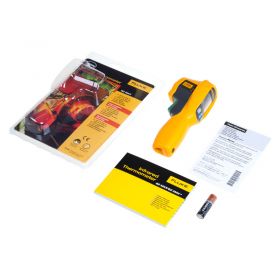

- Highly accurate, easy-to-use, fast-responding non-contact infrared thermometer
- Rugged, durable design (can withstand drops from a height of up to 3m)
- Ideal for use in many different HVAC applications
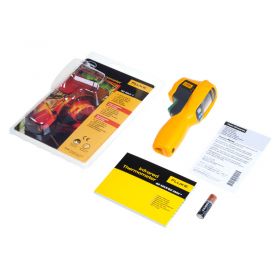

- High accuracy, infrared temperature measurements from a distance
- Exclusive dual laser technology allows users to easily pinpoint a target
- Temperature alarm, rugged design and different measurement functions
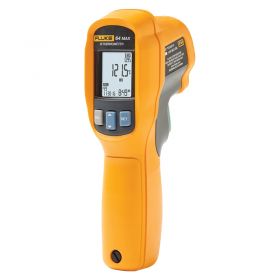

- Ergonomic, cost-effective, precise infrared thermometer suitable for use outdoors
- 20:1 distance to spot ratio
- Auto-capture and internal memory means this thermometer can be left unattended
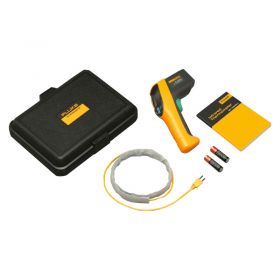

- Efficient and powerful IR thermometer
- Ideal for scanning temperatures in difficult to reach areas
- Excellent temperature measurement range
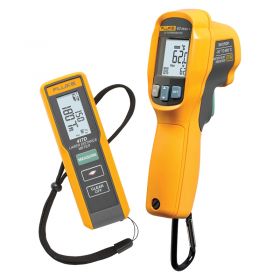

- Perform non-contact temperature measurements on mechanical and electrical equipment
- Measure distances up to 40m/ 131ft to an accuracy of 2mm/ 0.08”
- Point-and-shoot designs for easy and efficient operation
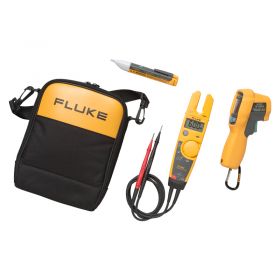

- Three testers in one kit
- Great for use by HVAC and electrical professionals
- Measure electrical and temperature
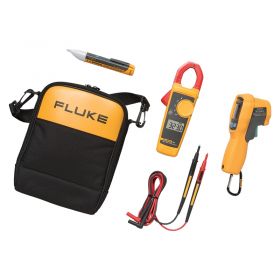

- Ideal for troubleshooting electrical installations
- Perform accurate, non-contact temperature measurements using the Fluke 62 MAX+
- Use the Fluke 323 TRMS Clamp Meter to measure electrical parameters accurately and reliably
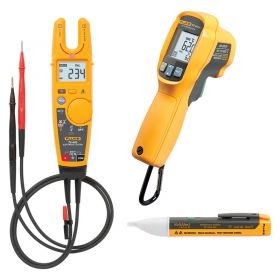

- Includes Fluke’s T6-600 Electrical Tester, 62 MAX+ IR Thermometer, and 1 AC-II VoltAlert Voltage Detector
- Fluke T6-600 Electrical Tester includes FieldSense technology
- Ideal for use in hard-to-access places
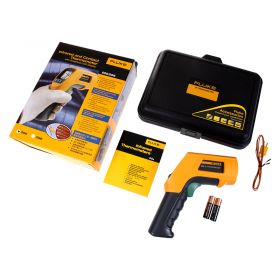

- 30:1 distance-to-spot ratio
- Capable of recording both infrared and contact temperatures with ease
- 1% accuracy level for extreme precision
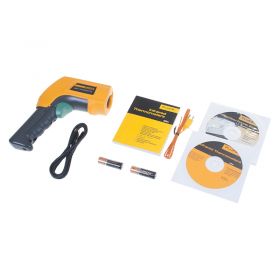

- User selectable ºC or ºF
- Laser sighting for accuracy (<7.0 meters)
- Optical Resolution: 50:1
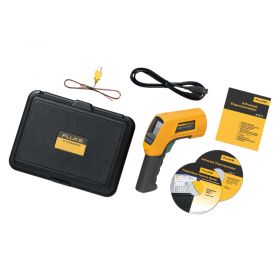

- Wide temperature range
- Handheld and portable
- Dual laser for precise measurements
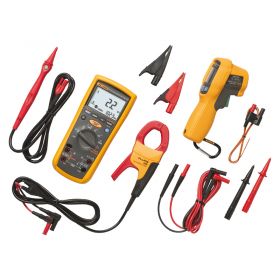

- Includes 1587 FC insulation tester/multimeter, i400 AC current clamp and 62 MAX+ Infrared thermometer
- Also comes with test leads and carrying case
- Prevent downtime and test with ease
About Infrared (IR) Thermometers
Due to innovations in thermal technology many thermometers now use infrared to measure temperatures, allowing you to scan specific areas without the use of temperature probes.
Also known as laser and non-contact thermometers, these devices use thermal radiation emitted by an object to gain an accurate reading that is usually displayed in either Fahrenheit, Celsius, or Kelvin. Some devices are called laser thermometers because they also include a built-in visible laser beam that allows you to direct the tester to the exact point where you want to test. Non-contact thermometers are designed to work from a distance, which is suitable for extreme temperatures where it isn't safe for humans to be near the test zone.
Although they are used in many different sectors, infrared thermometers have become particularly useful for electricians surveying different kinds of equipment. By scanning components of a device using an infrared thermometer you can quickly and easily determine which devices are working correctly and which aren't thanks to the temperature reading obtained; if a component is too hot or cold, it's obvious that it isn't working correctly and could be causing a problem. This means that using a thermometer that uses infrared technology is the perfect extension of an electrician's tool kit.
Infrared thermometers are used by firefighters to quickly assess areas for dangerous 'hot spots' and therefore make sure an area is safe before going in. This is useful for both safety purposes and for actually locating the source of a fire, allowing the firefighters to save lives, minimise property damage and provide a more efficient service.
In addition, many other sectors such as gas and HVAC, the medical industry, weather forecasting, the processing industry (and quality control), and many others can find great use in an infrared thermometer for a wide variety of different situations.


